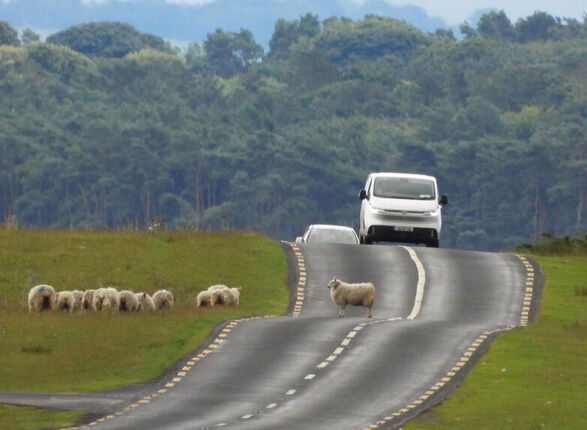Lankum underwent a recent rebranding.
PHOTO BY JUDITH BURROWS
By Daniel Neely
On Friday, the band Lankum’s new album “Between The Earth And Sky” appeared in my mailbox. It’s an album I have been anxiously awaiting for quite some time now and since its arrival I’ve been listening to it non-stop. It’s a brilliant, cutting album that I expect will get a wide listenership both within and beyond the Irish community, not simply because of its quality, but because of the consciousness it brings. It’s a dark album that makes some bracing, challenging points about contemporary Ireland as well as the world we live in.
“Lankum,” you say? “I’ve not yet heard of this band. Do tell more!” We need to start, then, with the band Lynched, a Dublin-based group comprising Ian Lynch (vocals, uilleann pipes, English concertina), Daragh Lynch (vocals, guitar, piano), Cormac Mac Diarmada (vocals, violin, viola), and Radie Peat (vocals, concertinas, harmonium, bayan, piano, harp). I reviewed their album “Cold Old Fire” here in 2014, and was one of at least 47 reviewers who not only loved its smart selection of deftly delivered original and traditional songs, but who were surely glad for the band’s success and the accolades it subsequently received, including BBC Radio 2 Folk Award nominations in 2016 for Best Album, Best Band, and its Horizon Award.
But in October of last year, Lynched revealed in a press release that it had changed its name to Lankum. Their reason was simple and unequivocal: “we will not continue to work under our current name while the systemic persecution and murder of black people in the USA continues.” Simple as. The name “Lankum,” they explained, came from the ballad “False Lankum,” a variant of Child Ballad no. 93 “Lamkin,” as performed on a field recording by the Irish Traveller, John Reilly Jr.
The press release concluded with the following line: “as always, we will continue to stand in firm solidarity with oppressed, marginalized and displaced people, both here in Ireland and internationally.” This closing statement answered any questions about where Lankum’s beliefs and motivations lay. However, it might well have been the artist statement for “Between the Earth and Sky,” as each of the album’s songs reaches out to oppressed, marginalized, and displaced points of view in different but conspicuous ways, all while building on the group’s unique stylistic vision.
This combination makes this an impressive album, front to back. Its opener, “What Will We Do When We Have No Money,” is an exhilarating track that features Peat on lead vocal with Ian’s support on drone and regulators. With its origins in a version of “What Would You Do if you Married a Soldier” sung by Irish Traveler Mary Delaney, Lankum’s approach here is stark and brooding and given a bit of animation through Peat considerable voice. It’s a striking way to start the album and it sets a strong tone. (Peat, incidentally, made an appearance in “Song of Granite,” the film about Joe Heaney that was the subject of two of my columns in recent weeks.)
“Peat Bog Soldiers” was a song written by prisoners in a Nazi labor camp in Börgermoor, Germany, in 1933. Lankum has set this important and widely known protest song, which has been performed by the likes of Pete Seeger, Paul Robeson, Luke Kelly, and many others, in an unaccompanied four-part harmony that reminds me a bit of American shape note hymnody. It’s a catchy, but deadly serious track that’s hard to get out of your head once you’ve heard it.
Another of the album’s compelling tracks is “Sergeant William Bailey,” an anti-recruiting song, written by Peadar Kearney, author of "The Soldier's Song.” It’s been previously recorded by the likes of the Wolfe Tones and Dominic Behan, but make no mistake, this isn’t a simple, pub-friendly rebel song sing along. Lankum’s approach is superb and controlled with Ian taking the lead vocal, and Daragh’s guitar & Mac Diarmada’s fiddle adding drive. The track ends with a raucous march in fife-and–drum arrangement in which they’re joined by Daire Garvin (snare drum), John Flynn (fife), Alex Borwick (trombone). There’s great humor and wit in the unexpected turn the arrangement takes, and it works wonderfully.
Then there are the two tracks that really stand out on their own, “Déanta in Éireann” and “The Granite Gaze.” Both Lankum originals, the first is a ballad about Irish emigration with uilleann drone and fiddle accompaniment. The lyrics start with a few cheeky observations about leaving Ireland, but they build into a scathing indictment of the “cult of the canny cute hoor” and then lead into a diasporic call to action against the “primates erect” who sit in the Dáil. As the lyrics unfold, the accompaniment warps in small but noticeable ways to match the song’s sentiment and it slowly increases in volume and intensity, only to cut at the end. Its effect is jarring. Although the song’s unflinching directness will perhaps cut against traditional notions many might have about broadside balladry, it fits the context and adds tremendously to the album.
https://youtu.be/cZo5qs2VamE
Peat once again provides lead vocals on “The Granite Gaze,” which is perhaps the album’s finest track and a perfect companion for “Déanta in Éireann.” A bleak but beautiful aisling lament in which Ireland is the “mother who eats her own,” the track opens with Peat asking “are we the ones / left behind / by those who weave / cords that bind?” As the lyrics explore notions of indifference and exploitation, the track’s expansive arrangement builds to a lush, complex crescendo built on a spectrum of free reed and string instruments. The song’s final verse provides the crushing answer to the initial question: “we are the ones / left behind / in swaddling bound / with baling twine.” It’s a remarkable, unforgettable track.
Is “Between The Earth And Sky” one of those once-in-a-lifetime albums that changes everything by rewriting the rulebook and rearranging the spectrum of traditional Irish nuance? Well, that’s a tall ask. But is it an album like that pint you’d wish would never end? That one so powerful you hope it might last…forever? Ah, now that’s an easier proposition to get behind. However this album hits you, the bottom line is that “Between The Earth And Sky” isn’t an “easy” album, but it’s a brilliant one. Lankum’s pulled no punches when it comes to subject matter and I can see some having a negative reaction to their uncompromising ethic. But there are things that need to be said about this world, and Lankum seems to be the one band currently best equipped to do it. An absolute must hear. Learn more at lankumdublin.com.








